The liver is a remarkable organ, playing a crucial role in the body’s natural detoxification process. It’s responsible for breaking down and eliminating a wide range of toxins, chemicals, and other harmful substances that enter our system. But what if there was a way to support this vital function? Recent research has suggested that cocoa, a rich source of polyphenols and other beneficial compounds, may have the potential to aid in liver detoxification. This article will explore the scientific evidence and examine whether incorporating cocoa into a healthy diet can help promote optimal liver health and detoxification.
Key Takeaways
- The liver is the primary organ responsible for the body’s natural detoxification process.
- Cocoa contains polyphenols and other beneficial compounds that may support liver health.
- Research suggests cocoa may help protect the liver from oxidative stress and inflammation.
- Cocoa may enhance the activity of liver enzymes involved in the detoxification process.
- Incorporating cocoa into a balanced diet, along with other lifestyle factors, may provide a holistic approach to promoting optimal liver function.
Understanding the Liver’s Detoxification Process
The liver is a vital organ responsible for a wide range of essential functions, including the detoxification of the body. This complex process involves two main phases that work together to break down and eliminate toxins, chemicals, and other harmful substances from the body.
Role of the Liver in Detoxification
The liver plays a crucial role in the body’s natural detoxification process. It acts as a filter, breaking down and metabolizing a wide range of substances, including medications, environmental pollutants, and byproducts of metabolism. By performing this essential function, the liver helps to prevent the accumulation of these potentially harmful compounds and supports overall health and well-being.
Phases of Liver Detoxification
The liver’s detoxification process involves two main phases: Phase I (Activation) and Phase II (Conjugation). In Phase I, specialized enzymes break down toxins and convert them into intermediate compounds. These intermediates are then further processed in Phase II, where they are combined with other molecules, making them more water-soluble and easier for the body to eliminate through urine, bile, or feces. Understanding the intricate steps of this detoxification process is crucial in exploring the potential benefits of cocoa and other natural compounds for supporting liver health.
Cocoa: A Potential Ally for Liver Health
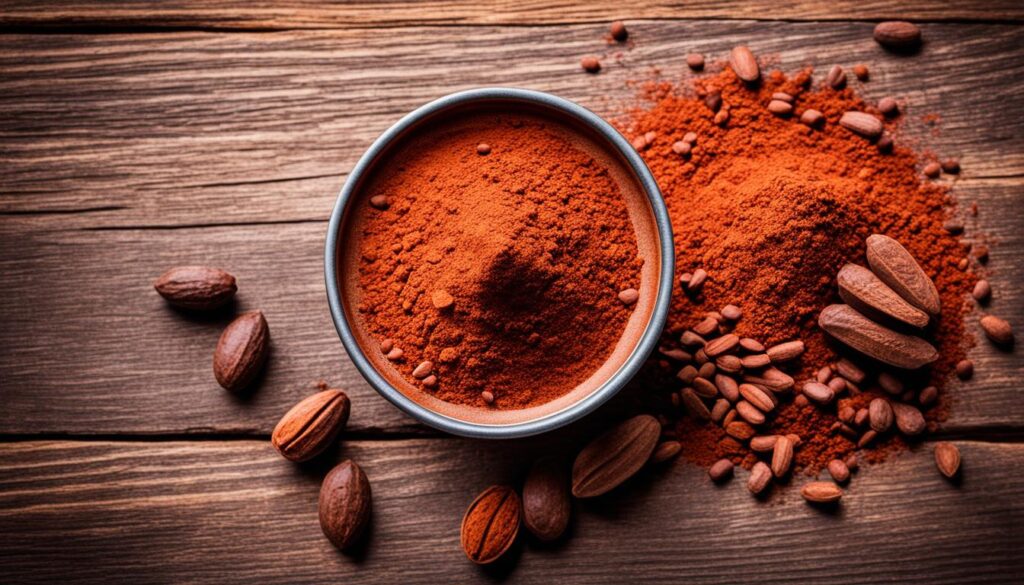
Cocoa, the key ingredient in chocolate, is rich in a variety of beneficial compounds, including polyphenols, flavanols, and methylxanthines. These compounds are known for their potent antioxidant and anti-inflammatory properties, which may contribute to their potential to support liver health.
Antioxidant Properties of Cocoa
Numerous studies have suggested that the antioxidant compounds in cocoa can help neutralize free radicals and reduce oxidative stress, both of which can play a role in liver damage and dysfunction. The antioxidants in cocoa may help protect the liver by scavenging harmful free radicals and supporting the body’s natural antioxidant defenses.
Cocoa and Inflammation Reduction
In addition to its antioxidant properties, cocoa has also been shown to possess anti-inflammatory effects. The anti-inflammatory compounds in cocoa may help mitigate inflammation in the liver, a common contributor to various liver diseases. By reducing inflammation, cocoa may support the liver’s ability to function optimally and maintain its crucial detoxification processes.
Can cocoa help in supporting liver detoxification?
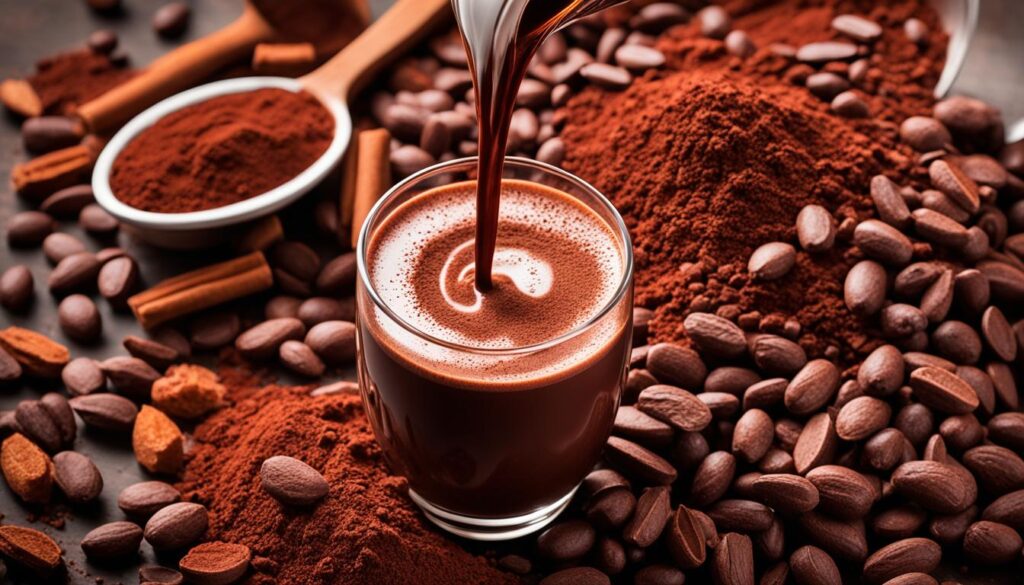
The potential for cocoa to support liver detoxification is an area of ongoing research. The antioxidant and anti-inflammatory properties of cocoa’s bioactive compounds, such as polyphenols and flavanols, may help protect the liver from oxidative stress and inflammation, both of which can impair the liver’s natural detoxification processes. Some studies have suggested that cocoa may enhance the activity of liver enzymes involved in Phase I and Phase II detoxification, potentially improving the liver’s ability to break down and eliminate toxins. However, more research is needed to fully understand the specific mechanisms by which cocoa may aid liver detoxification and to determine the optimal dosage and consumption patterns.
While the scientific evidence is promising, it’s important to note that more research, particularly human clinical trials, is needed to fully understand the potential benefits of cocoa for liver detoxification. Incorporating cocoa into a balanced and healthy diet, along with other lifestyle factors that support liver function, may provide a holistic approach to promoting optimal liver health. As always, it’s crucial to consult with a healthcare professional before making significant changes to diet or supplement regimen, especially for those with pre-existing medical conditions or taking medications.
| Potential Benefits of Cocoa for Liver Detoxification | Limitations and Considerations |
|---|---|
|
|
Overall, the potential for cocoa to support liver detoxification is an intriguing area of research, and further studies are needed to elucidate the specific mechanisms and optimal ways to incorporate cocoa into a healthy lifestyle for liver health and detoxification support.
Exploring the Scientific Evidence
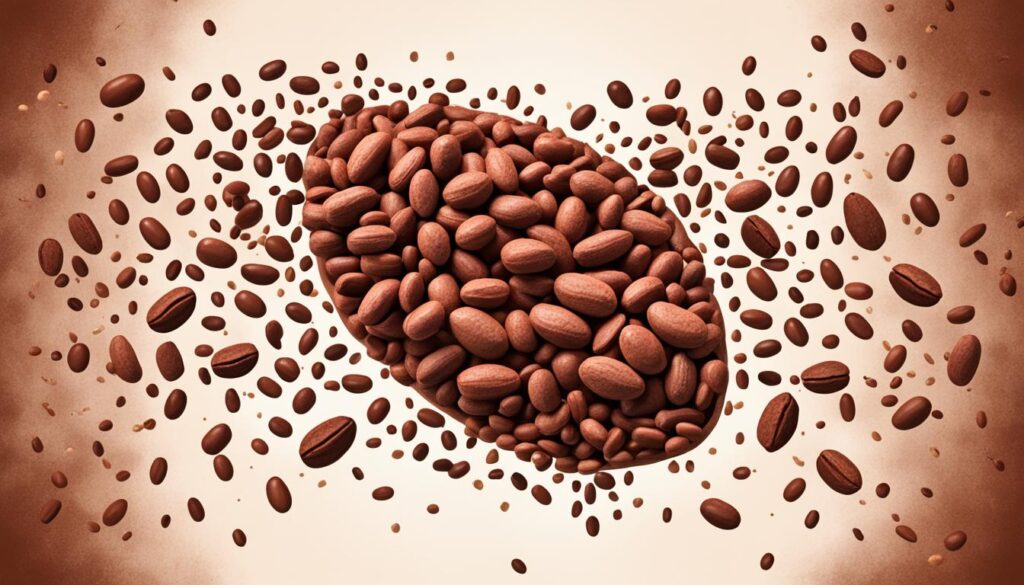
Several studies have investigated the potential benefits of cocoa for liver health and detoxification. Some research has found that cocoa consumption can help reduce markers of liver inflammation and oxidative stress, which are closely linked to liver dysfunction and disease. Additionally, some animal studies have suggested that cocoa may enhance the activity of key liver enzymes involved in the detoxification process.
However, it’s important to note that the majority of the research has been conducted on animal models or in-vitro settings, and more human clinical trials are needed to fully understand the direct effects of cocoa on liver detoxification in humans. Factors such as the type of cocoa, dosage, and individual differences in metabolism may also influence the potential benefits.
Research on Cocoa and Liver Health
The scientific studies on cocoa’s effect on liver have provided promising insights, suggesting that the antioxidant and anti-inflammatory properties of cocoa’s bioactive compounds may play a role in supporting liver function and detoxification. However, the limitations of research on cocoa and liver detoxification highlight the need for more comprehensive investigation, particularly in human clinical trials, to fully understand the mechanisms and potential therapeutic applications.
Limitations and Considerations
While the existing research on scientific research on cocoa and liver health is encouraging, it’s crucial to consider the limitations and additional factors that may influence the potential benefits of cocoa for liver detoxification. The studies on cocoa’s effect on liver have primarily been conducted in animal models or in-vitro settings, which may not accurately reflect the complex interactions and responses in the human body. Limitations of research on cocoa and liver detoxification also include the need for larger-scale, well-designed human clinical trials to provide more definitive evidence.
Incorporating Cocoa into a Healthy Diet
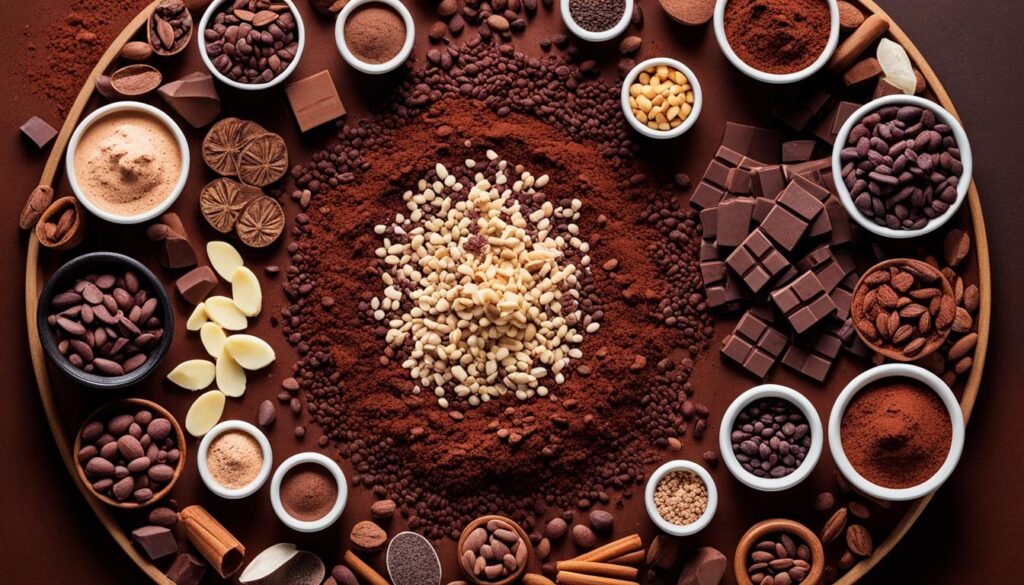
If the potential benefits of cocoa for liver health and detoxification are of interest, there are several ways to incorporate this versatile ingredient into a balanced and nutritious diet. Cocoa can be found in a variety of products, each offering unique opportunities to enjoy its rich flavors and potential health-supporting properties.
Types of Cocoa Products
Dark chocolate, with its higher cocoa content and lower sugar content, is generally considered the healthiest option when it comes to incorporating cocoa into a healthy diet. Dark chocolate provides a higher concentration of the beneficial polyphenols and flavanols that may contribute to its potential liver-supporting effects. Beyond dark chocolate, cocoa powder and cocoa nibs can also be easily incorporated into a variety of recipes, from smoothies and baked goods to savory dishes.
Moderation and Balance
While the incorporation of different types of cocoa products can be a delicious and potentially beneficial addition to a healthy lifestyle, it’s important to practice moderation in cocoa consumption. Overconsumption of cocoa can lead to potential side effects, such as digestive discomfort or changes in blood pressure. Maintaining a balanced diet and overall healthy lifestyle are crucial for optimizing liver health and supporting the body’s natural detoxification processes.
Lifestyle Factors for Optimal Liver Function

While the potential benefits of cocoa for liver health and detoxification are promising, it’s important to consider other lifestyle factors that can contribute to optimal liver function. Regular exercise and physical activity can help improve blood flow, reduce inflammation, and support the liver’s ability to metabolize and eliminate toxins. Stress management techniques, such as meditation, yoga, or deep breathing, can also be beneficial, as chronic stress can negatively impact liver function. Additionally, staying hydrated and getting adequate sleep are essential for the liver to perform its crucial detoxification duties effectively. Incorporating a holistic approach that combines a balanced diet, including cocoa, with a healthy lifestyle can provide the best support for liver health and detoxification.
Exercise and Physical Activity
Regular physical activity can play a significant role in supporting the liver’s function. Exercise helps improve blood flow, which can enhance the liver’s ability to filter out toxins and metabolic byproducts. Additionally, physical activity can reduce inflammation, a key factor in various liver diseases. Engaging in a variety of exercises, such as aerobic activities, strength training, and yoga, can provide a well-rounded approach to promoting optimal liver health.
Stress Management
Chronic stress can have a detrimental impact on the liver’s ability to function effectively. Prolonged stress can lead to increased inflammation, oxidative stress, and metabolic disturbances, all of which can impair the liver’s detoxification processes. Incorporating stress management techniques, such as meditation, deep breathing exercises, or mindfulness practices, can help mitigate the negative effects of stress and support liver function.
Hydration and Adequate Sleep
Staying hydrated and getting sufficient sleep are essential for the liver to perform its crucial detoxification duties. Proper hydration helps the liver flush out toxins and waste products more efficiently, while adequate sleep allows the liver to regenerate and repair itself. Aiming for at least 7-9 hours of quality sleep each night and drinking plenty of water throughout the day can contribute to optimal liver health and function.
By incorporating a holistic approach that includes a balanced diet with cocoa, regular exercise, stress management, and proper hydration and sleep, individuals can take proactive steps to support their liver’s overall health and detoxification capabilities.
Potential Risks and Side Effects

While cocoa and its derivatives are generally considered safe for most people, it’s important to be aware of the potential risks and side effects, especially for those with certain health conditions or taking medications. Cocoa contains compounds like caffeine and theobromine, which can interact with some medications and may cause adverse effects, such as increased heart rate or digestive issues.
Interactions with Medications
The caffeine and theobromine present in cocoa can potentially interact with certain medications, leading to unwanted side effects. Individuals taking prescription drugs, such as antidepressants, blood thinners, or medications for heart conditions, should consult with their healthcare provider before significantly increasing their cocoa intake. Careful monitoring and dose adjustments may be necessary to ensure the safe and effective use of both the medication and cocoa-based products.
Allergies and Sensitivities
Some people may have allergies or sensitivities to cocoa or its components, which can trigger a range of symptoms, including rashes, headaches, or digestive discomfort. Those with known food allergies or intolerances should be particularly cautious when incorporating cocoa into their diet and monitor their body’s reaction closely. It’s always recommended to consult with a healthcare professional before making significant changes to one’s diet or supplement regimen, especially for those with pre-existing medical conditions or sensitivities.
| Potential Risks of Cocoa | Possible Side Effects |
|---|---|
| Interactions with Medications | Increased heart rate, digestive issues |
| Allergies and Sensitivities | Rashes, headaches, digestive discomfort |
It’s important to note that while cocoa is generally considered safe, individuals should exercise caution and consult with a healthcare professional before significantly increasing their consumption, especially if they have pre-existing medical conditions or are taking prescription medications.
Natural Liver-Supporting Supplements
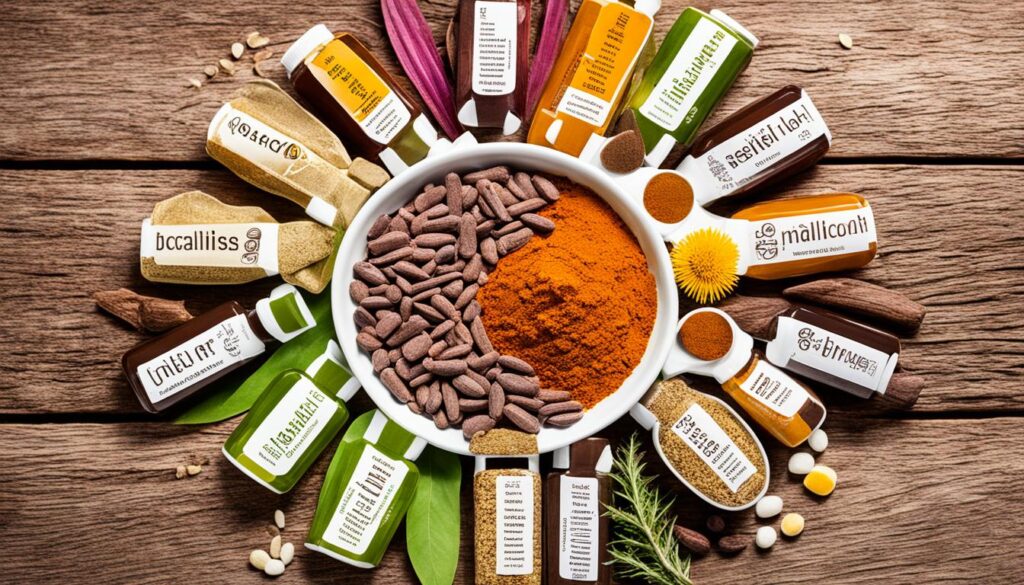
In addition to incorporating cocoa into a healthy diet, there are several other natural supplements that may provide additional support for liver health and detoxification. Milk thistle, a herb rich in the compound silymarin, has been extensively studied for its potential to protect the liver and promote regeneration of liver cells. Turmeric, with its active ingredient curcumin, is known for its anti-inflammatory and antioxidant properties, which may benefit the liver. Dandelion root is another natural herb that has been traditionally used to support liver function and detoxification. It’s important to consult with a healthcare professional before starting any new supplement regimen, as individual needs and interactions may vary.
Milk Thistle
Milk thistle, a plant native to the Mediterranean region, has been used for centuries to support liver health. The active compound in milk thistle, silymarin, has been extensively studied for its potential to protect the liver from damage and promote the regeneration of liver cells. Research has suggested that milk thistle may help reduce markers of liver inflammation and oxidative stress, which are common contributors to various liver diseases.
Turmeric
Turmeric, a vibrant yellow spice widely used in Indian and Middle Eastern cuisines, has gained attention for its potential benefits for liver health. The active compound in turmeric, curcumin, is known for its potent anti-inflammatory and antioxidant properties. Studies have indicated that curcumin may help reduce liver inflammation, protect against oxidative stress, and even enhance the liver’s detoxification capabilities.
Dandelion Root
Dandelion root is another natural supplement that has been traditionally used to support liver function and detoxification. This humble herb is rich in various compounds, such as vitamins, minerals, and antioxidants, which may contribute to its potential liver-supporting effects. Some research has suggested that dandelion root may help stimulate the production of bile, which is essential for the liver’s ability to eliminate toxins and waste from the body.
It’s important to note that while these natural supplements may provide additional support for liver health and detoxification, it’s crucial to consult with a healthcare professional before incorporating them into your routine, especially if you have any pre-existing medical conditions or are taking medications. The potential benefits and potential interactions may vary from individual to individual.
When to Seek Professional Advice

While incorporating cocoa and other natural supports into a healthy lifestyle may be beneficial for liver health and detoxification, it’s crucial to be aware of the signs of liver dysfunction and seek professional medical advice when necessary. Persistent fatigue, abdominal pain, yellowing of the skin and eyes (jaundice), and unexplained weight loss can all be indicators of underlying liver issues.
Signs of Liver Dysfunction
When individuals experience these types of signs of liver dysfunction, it’s important to consult with a healthcare provider, such as a gastroenterologist or hepatologist, who can properly assess liver function, identify any underlying conditions, and provide appropriate medical guidance and treatment, if needed.
Consulting with Healthcare Providers
Working closely with a healthcare professional can help ensure the safe and effective use of any dietary supplements or lifestyle changes for optimal liver health. They can offer personalized recommendations and monitor any changes in liver function, ensuring that the individual’s specific needs are addressed.
Conclusion
In conclusion, the potential for cocoa to support liver detoxification is an intriguing area of research. The antioxidant and anti-inflammatory properties of cocoa’s bioactive compounds, such as polyphenols and flavanols, may help protect the liver and enhance its natural detoxification processes. While the scientific evidence is promising, more research, particularly human clinical trials, is needed to fully understand the specific mechanisms and optimal dosages for cocoa’s potential benefits on liver health and detoxification.
Incorporating cocoa into a balanced and healthy diet, along with other lifestyle factors that support liver function, may provide a holistic approach to promoting optimal liver health. As always, it’s important to consult with a healthcare professional before making significant changes to diet or supplement regimen, especially for those with pre-existing medical conditions or taking medications.
The key takeaways on cocoa and liver detoxification include the potential of cocoa’s antioxidant and anti-inflammatory properties to support the liver’s natural detoxification processes. Additionally, a summary of cocoa’s potential benefits for liver health suggests that further research is needed to fully understand the specific mechanisms and optimal dosages for these benefits.

Leave a Reply